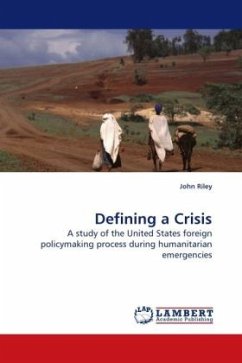
Defining a Crisis
A study of the United States foreign policymaking process during humanitarian emergencies
Versandkostenfrei!
Versandfertig in 6-10 Tagen
52,99 €
inkl. MwSt.

PAYBACK Punkte
26 °P sammeln!
Why does the United States intervene in some humanitarian crises and not others? This text examines news media coverage of the Somali and Rwandan crises and tests the extent to which that coverage prompted policymakers to intervene. These findings suggest that the news media rarely set policy-makers agendas: the news media have not hijacked U.S. foreign policy. However, the news media do not simply serve the will of policy-makers either. News media coverage influences the political environments in which policy-makers act and thereby raise the political saliency of certain policy alternatives. ...
Why does the United States intervene in some humanitarian crises and not others? This text examines news media coverage of the Somali and Rwandan crises and tests the extent to which that coverage prompted policymakers to intervene. These findings suggest that the news media rarely set policy-makers agendas: the news media have not hijacked U.S. foreign policy. However, the news media do not simply serve the will of policy-makers either. News media coverage influences the political environments in which policy-makers act and thereby raise the political saliency of certain policy alternatives. How the news media frame a crisis helps define the alternatives for U.S. action.












